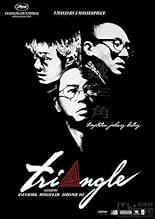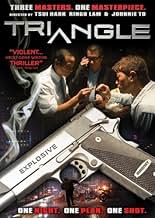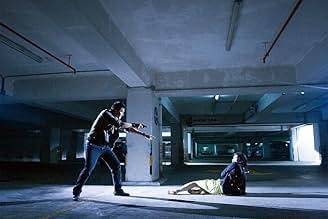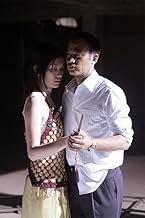VALUTAZIONE IMDb
6,2/10
1946
LA TUA VALUTAZIONE
Aggiungi una trama nella tua linguaTold in three 30-minute segments, three friends seek out the buried treasure of a mysterious stranger.Told in three 30-minute segments, three friends seek out the buried treasure of a mysterious stranger.Told in three 30-minute segments, three friends seek out the buried treasure of a mysterious stranger.
- Regia
- Sceneggiatura
- Star
- Premi
- 2 vittorie e 1 candidatura in totale
Honglei Sun
- Mok Chung Yuan
- (as Sun Hong Lei)
Ka-Tung Lam
- Wen
- (as Lam Ka Tung)
Kai Wa Chan
- Kwan
- (as Chan Kai Wa)
Chun Yip
- Chan Fok-sui
- (as Yip Chun)
Libby Brien
- Fai's Mother
- (English version)
- (voce)
- …
Philip Hersh
- Wen
- (English version)
- (voce)
Chi-Shing Chiu
- Mob Boss
- (non citato nei titoli originali)
Recensioni in evidenza
If a movie can't hold your interest in the first 25 minutes, it's over as far as I'm concerned. This concept that you have to simply deal with a slow first third of a movie and be rewarded later is nonsense. A good movie has to start and end strong. It all seem interesting and some decent shots and lots of promise, but ultimately muddled and irrelevant. There are so many other movies from Asia to watch, many of which I am sure most of you have not seen, that I would really skip this one and look elsewhere. Why exactly does IMDb require a 10 line minimum for reviews? I said my piece and I hope this helps a few of you move on to the next film.
My clockmaker friend was not pleased. His rating system is such: If you look at your watch once, its a good movie. Twice is pushing your luck and three times and you're out of luck. ( No clock being the perfect movie ). He took 3 looks. Though having some decent scenes you sort of get a mixed bag of plotting, double-crossing and old style Tsui Hark slapstick. Still we found it worth talking about afterward a bit, so maybe its worth a look... Side plots aren't concluded and motivations aren't all too clear, the segmentation isn't really clear, you don't really see the 3 parts differentiate from each other. Still, could have fared worse since for a change the action was not the consuming theme, instead the few fights being portrayed in what i'd imagine to be a realistic fashion, won't tell more.. Some good comedy , good milieu, gotta be fair it had some OK content to it too.
A novel idea, originating in Tsui Hark I believe, to make a film based on the old game of incremental story-telling, passing the baton between 3 of Hong Kong's (once) top directors (they should have swapped Johnnie To for John Woo and called it "The Victims of Jean-Claude Van-Damme Rehabilitation Project"). The result is, sadly, almost as incoherent as a nay-sayer might expect it to be.
The first third of the film (Tsui) is kind of scatter-shot, throwing ideas out there for the other directors to pick up on, centred around a heist movie setup with 3 main protagonists (Simon Yam, Louis Koo and Sun Hong-Lei) - setting up a triangle that clearly hints where he really wants the movie to go. This section does suffer from that amphetamine-high lack of focus that sometimes afflicts Tsui Hark when he has too many ideas for a movie, and can't decide which ones are really important.
Ringo Lam takes over just before 30 minutes in, and the mood shifts - he evidently wants to create a psychological horror instead of a crime movie, and shifts the focus more to the characters played by Kelly Lin and Gordon Lam. This part is eerie and oblique, a little surreal at times but much more focused.
Then Johnnie To comes in for the final act, and decides that the film should really be... a farce! Perhaps it's his way of commenting on the baby he has been left holding. Every character that's been introduced so far is brought back into play, along with a couple of new ones (notably Lam Suet), and the plot plays itself out in an elaborate comedy of errors hinged upon a series of entirely implausible coincidences. The finale is a gun battle vaguely reminiscent of those in THE MISSION or EXODUS, but with a more comical coating. It's a bit Shakespearean, but falls short of The Bard's wit.
The shifting of tones, and the diverting focus of the narrative, is exactly the sort of problem you'd expect a movie with three directors and three script-writing teams to have. Perhaps that was the point, and each director deliberately took the movie into their own favourite territory when they took the reins. I guess that's how it usually happens when people play the game amongst themselves (I forget the name of it, never really saw the appeal), but they perhaps failed to factor in that the game is more fun for the people playing it than for somebody who simply gets handed the end result. The production process may be interesting to talk or think about, but probably makes for a less enjoyable film than a more conventional collaboration would have.
I did enjoy Ringo Lam's section though - hopefully it's a sign he's going to be doing more work in Hong Kong again!
The first third of the film (Tsui) is kind of scatter-shot, throwing ideas out there for the other directors to pick up on, centred around a heist movie setup with 3 main protagonists (Simon Yam, Louis Koo and Sun Hong-Lei) - setting up a triangle that clearly hints where he really wants the movie to go. This section does suffer from that amphetamine-high lack of focus that sometimes afflicts Tsui Hark when he has too many ideas for a movie, and can't decide which ones are really important.
Ringo Lam takes over just before 30 minutes in, and the mood shifts - he evidently wants to create a psychological horror instead of a crime movie, and shifts the focus more to the characters played by Kelly Lin and Gordon Lam. This part is eerie and oblique, a little surreal at times but much more focused.
Then Johnnie To comes in for the final act, and decides that the film should really be... a farce! Perhaps it's his way of commenting on the baby he has been left holding. Every character that's been introduced so far is brought back into play, along with a couple of new ones (notably Lam Suet), and the plot plays itself out in an elaborate comedy of errors hinged upon a series of entirely implausible coincidences. The finale is a gun battle vaguely reminiscent of those in THE MISSION or EXODUS, but with a more comical coating. It's a bit Shakespearean, but falls short of The Bard's wit.
The shifting of tones, and the diverting focus of the narrative, is exactly the sort of problem you'd expect a movie with three directors and three script-writing teams to have. Perhaps that was the point, and each director deliberately took the movie into their own favourite territory when they took the reins. I guess that's how it usually happens when people play the game amongst themselves (I forget the name of it, never really saw the appeal), but they perhaps failed to factor in that the game is more fun for the people playing it than for somebody who simply gets handed the end result. The production process may be interesting to talk or think about, but probably makes for a less enjoyable film than a more conventional collaboration would have.
I did enjoy Ringo Lam's section though - hopefully it's a sign he's going to be doing more work in Hong Kong again!
10clyderay
Very good effort from the three directors. The story were made so compact that the movie appeared too short to me. Because I am not a fan for either of them, I could not really tell which part was made by whom. However, the movie has kept quite a consistency in style, to me it is already an achievement for the three.
Great layout of stages and clues were provided to the audience. Some particular points may looked chance-medley, but there were also inevitability alongside (e.g. the crazy guy kept shaking his head seems odd, but he is the man who gives convincing enough reason to bring the wanted police, the three ghouls and the police officer together.).
The blackout section was the most exciting and breath taking part of the movie. When all the forces came meet together with interaction and conflict of interests. Very dramatic and humorous, with a touch of personal loyalty for covering each other.
There were also many choices available to characters, obvious one was when the antiquary guy throwing the treasure in the reed bush, when he had kill-or-not-to-kill option the moment before. Another example is when all 4 of them got out of the bush and looked back to the surrounded cop, they kept looking till confirming the cop is really good at shooting, and passed the option on to him.
Overall, with the discussion of the human nature against survival, the movie made itself outstanding.
Great layout of stages and clues were provided to the audience. Some particular points may looked chance-medley, but there were also inevitability alongside (e.g. the crazy guy kept shaking his head seems odd, but he is the man who gives convincing enough reason to bring the wanted police, the three ghouls and the police officer together.).
The blackout section was the most exciting and breath taking part of the movie. When all the forces came meet together with interaction and conflict of interests. Very dramatic and humorous, with a touch of personal loyalty for covering each other.
There were also many choices available to characters, obvious one was when the antiquary guy throwing the treasure in the reed bush, when he had kill-or-not-to-kill option the moment before. Another example is when all 4 of them got out of the bush and looked back to the surrounded cop, they kept looking till confirming the cop is really good at shooting, and passed the option on to him.
Overall, with the discussion of the human nature against survival, the movie made itself outstanding.
The idea behind this film was to get three of the best Hong Kong action/crime directors today working together. The result was each did one segment (around 30 minutes each) in chronological order with Tsui first, Lam second and To finishing it off. This would be done differently than a film like Four Rooms (1995) where each segment was basically a separate story. In this movie each director would continue after the other to move the story and characters along from what happened previously. Like many conceptual films this movie sometimes seems a bit forced, sometimes clunky, some plot angles hang, disappear and seem a bit confusing, but I still found the movie quite interesting and entertaining.
Triangle (the Chinese title is The Iron Triangle) starts off with Tsui Hark creating the foundation for the plot. It is both good and bad that Hark creates tons of plot angles for the movie to go. It gives the Ringo and later To plenty of room to move with, but also will leave either a bit too much to be either ignored and some angles barely gone over that a tighter script would have just ignored. In fact it took me a few tries to get past the beginning.
Simon Yam (PTU, Election) is Lee Bo Sam a former race driver who is friends with Fai (Louis Koo: Throwdown) and antique shop owner Mok Chung-yuan (Sun Hong Lei: Seven Swords). Fai is trying to get him to acquiesce to a driving job for a jewelry heist. If he does not Fai will receive harm from some local triad members. All three need money though. In the middle of the meeting between Fai and Lee a strange man gives those three a small gold piece and states where they can find the rest of this treasure. His motives for doing this are a mystery to the bunch. Meanwhile Lee's wife Lin (Kelly Lin: Sparrow) is having an affair with policeman Wen (Gordon Lam), states that her husband is trying to have her killed off and wants Lam to get rid of Sam first.
When Ringo Lam takes over in the first film he has directed since leaving the production of Wake of Death (2004), he ups the psychological attitude of the film and enriches the characterization. The most effective change is how the love-triangle relationship between Lam, Lin and Sam no longer appears to be the stereotypical triangle in the beginning and takes on a new bizarre dimension. Ringo Lam does a homage to Reservoir Dogs which was based on his film City on Fire so you see a homage to an homage) by using a record player, a handcuffed cop and a few other scenarios in this middle segment of the film.
The last segment belongs to Johnnie To and from the beginning where we see Lam Suet (Lam is in a lot of Johnnie To movies) we know who is directing this. Suet plays a drug addicted epileptic who causes flats in both automobiles and bikes and offers to fix them. The area where he is in has no cellular reception and a conveniently located eatery where they can wait while their vehicle is being fixed. However, Wen is there as well as the triad members who are there to purchase firearms. This is another use of the triangle in this film. To offers his normal use of "Team Spirit" themes and Mexican standoff action in this conflict triangle to make the last half hour quite interesting.
While this film never fully jells together, some plot changes are just a bit bizarre like Lin's character change (or really non-use) in the third segment, I still ended up really liking this film. There are quite enough brilliant moments that make this movie a recommendation for fans of not only Hong Kong cinema and Johnnie To, but movie fanatics as well. You just have to get past the first 15 minutes.
I have the Magnolia pictures R1 release that has two extra features: a "Making of" and a Behind the Scenes. The "Making of" is solely focused on Johnnie To's segment and ultimately not that interesting. It is mostly standing around, saying a few lines and more waiting. Behind the Scenes actually has the most information with interviews from several of the cast and crew. The region 3 release of this by Mega Star has deleted scenes, TV spots and trailers in addition to what the R1 has. I was most disappointed that the R1 does not have the deleted scenes, but it is still a worthwhile release.
Triangle (the Chinese title is The Iron Triangle) starts off with Tsui Hark creating the foundation for the plot. It is both good and bad that Hark creates tons of plot angles for the movie to go. It gives the Ringo and later To plenty of room to move with, but also will leave either a bit too much to be either ignored and some angles barely gone over that a tighter script would have just ignored. In fact it took me a few tries to get past the beginning.
Simon Yam (PTU, Election) is Lee Bo Sam a former race driver who is friends with Fai (Louis Koo: Throwdown) and antique shop owner Mok Chung-yuan (Sun Hong Lei: Seven Swords). Fai is trying to get him to acquiesce to a driving job for a jewelry heist. If he does not Fai will receive harm from some local triad members. All three need money though. In the middle of the meeting between Fai and Lee a strange man gives those three a small gold piece and states where they can find the rest of this treasure. His motives for doing this are a mystery to the bunch. Meanwhile Lee's wife Lin (Kelly Lin: Sparrow) is having an affair with policeman Wen (Gordon Lam), states that her husband is trying to have her killed off and wants Lam to get rid of Sam first.
When Ringo Lam takes over in the first film he has directed since leaving the production of Wake of Death (2004), he ups the psychological attitude of the film and enriches the characterization. The most effective change is how the love-triangle relationship between Lam, Lin and Sam no longer appears to be the stereotypical triangle in the beginning and takes on a new bizarre dimension. Ringo Lam does a homage to Reservoir Dogs which was based on his film City on Fire so you see a homage to an homage) by using a record player, a handcuffed cop and a few other scenarios in this middle segment of the film.
The last segment belongs to Johnnie To and from the beginning where we see Lam Suet (Lam is in a lot of Johnnie To movies) we know who is directing this. Suet plays a drug addicted epileptic who causes flats in both automobiles and bikes and offers to fix them. The area where he is in has no cellular reception and a conveniently located eatery where they can wait while their vehicle is being fixed. However, Wen is there as well as the triad members who are there to purchase firearms. This is another use of the triangle in this film. To offers his normal use of "Team Spirit" themes and Mexican standoff action in this conflict triangle to make the last half hour quite interesting.
While this film never fully jells together, some plot changes are just a bit bizarre like Lin's character change (or really non-use) in the third segment, I still ended up really liking this film. There are quite enough brilliant moments that make this movie a recommendation for fans of not only Hong Kong cinema and Johnnie To, but movie fanatics as well. You just have to get past the first 15 minutes.
I have the Magnolia pictures R1 release that has two extra features: a "Making of" and a Behind the Scenes. The "Making of" is solely focused on Johnnie To's segment and ultimately not that interesting. It is mostly standing around, saying a few lines and more waiting. Behind the Scenes actually has the most information with interviews from several of the cast and crew. The region 3 release of this by Mega Star has deleted scenes, TV spots and trailers in addition to what the R1 has. I was most disappointed that the R1 does not have the deleted scenes, but it is still a worthwhile release.
Lo sapevi?
- QuizAfter Tsui completed the first segment of Triangle, Lam looked at the development of it before shooting the second part, and handed the film to Johnnie To who completed the third part with its conclusion.
- Colonne sonoreLOVE IS LIKE A BALLOON
Performed by Xiu Qiong Pan
Composed by Yao Ming
Lyrics by Chen Di Yi
OP: EMI Music Publishing Hong Kong
Sound recording license courtesy of EMI Music Hong Kong
I più visti
Accedi per valutare e creare un elenco di titoli salvati per ottenere consigli personalizzati
Dettagli
Botteghino
- Budget
- 5.000.000 USD (previsto)
- Lordo in tutto il mondo
- 4.641.637 USD
- Tempo di esecuzione1 ora 33 minuti
- Colore
- Mix di suoni
- Proporzioni
- 2.35 : 1
Contribuisci a questa pagina
Suggerisci una modifica o aggiungi i contenuti mancanti





























